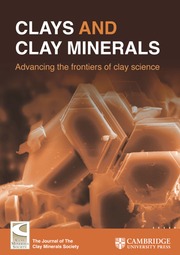Article contents
X-ray diffraction criteria for the identification of trans- and cis-vacant varieties of dioctahedral micas
Published online by Cambridge University Press: 01 January 2024
Abstract
To provide structural and diffraction criteria for the identification of trans-vacant (tv) and cis-vacant (cv) mica varieties with different layer stackings, powder X-ray diffraction (XRD) patterns have been simulated for 1M, 2M1, 2M2, 3T and 2O structural models consisting of either tv or cv layers. The differences in the unit-cell parameters resulting from the specific structural distortions of tv and cv layers lead to the differences in the positions of reflections having the same indices in the XRD patterns for tv and cv 1M, 2M1 and 2M2 mica varieties. The tv 1M, 2M1 and 2M2 varieties of Al-rich micas can therefore be distinguished from the corresponding cv varieties using powder XRD diffraction provided that the d values are measured with high precision and accurately compared with those calculated from the unit-cell parameters for the corresponding hkl indices. The differences in reflection positions for these tv and cv varieties should decrease with increasing Mg and/or Fe contents, thus complicating their identification.
The peak positions and intensity distributions in the XRD pattern for the tv 3T variety are similar to those for the cv 3T structure with the vacancy in the right-hand cis site (3T-cv1), and both XRD patterns are similar to that for the 1M-cv mica. The simulated XRD pattern for the cv 3T structure with the vacancy in the left-hand cis site (3T-cv2) is similar to that for the 1M-tv variety. The similarities and dissimilarities in intensity distribution between the XRD patterns simulated for the 1M and 3T varieties in question may be associated with the differences in the mutual arrangement of cations and anions in successive layers.
Possible interstratification of tv and cv layers within the same structure should seriously complicate the identification of dioctahedral mica polytypes and polymorphs.
Keywords
- Type
- Research Article
- Information
- Copyright
- Copyright © 2007, The Clay Minerals Society
References
- 13
- Cited by


